Eleven years ago over Christmas I was feeling ill in my stomach. I had to be convinced to go to an emergency room. I drove myself up there. Seven hours later I was waking up in an operating recovery room with the loss of about sixteen inches of large intestines and my appendix and the gain of a colostomy bag. I had a perforated bowel. Who knew? The colostomy bag was successfully reversed some two months later, thank God. Then about five years ago, I was diagnosed with kidney cancer. A kidney along with the cancer was removed, and I have not had any further difficulties. My first thought in reflecting on those experiences is how grueling and anxiety provoking were those periods of my life. My second thought, a little less self-pitying, is to be grateful for the treatment that in both instances saved my life. Imagine how fortunate I am. Two professional surgeons with years of training and experience were readily available to cut out significant organs from my body. I had health insurance to cover the extreme cost of such an important intervention. It is an incredible world we live in when such highly specialized skilled services can be channeled with ease in order to benefit someone who suffers great physical discomfort even to the risk of death.
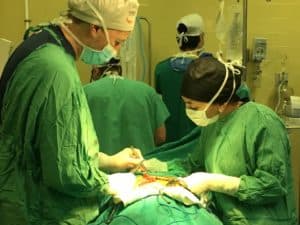
But, this is not so the world over, and it is certainly not the case for us here in this isolated and often forgotten territory of Honduras. For people here, there simply is no access to surgery. The closest hospital might be six hours away. Even so, the surgery may not be available there and the cost would be absolutely prohibitive. Many simply have to accept living with great discomfort, and in some cases there are much worse consequences including shortened life-spans. Having lived in a land of such fortune as the United States, it bears heavy on one’s conscience to witness such inequity. Some might shrug their shoulders and say that things are the way they are, and there is little to do to change it. Others find it unacceptable to shrug their shoulders, but instead shoulder the burden. They provide the witness that the inequity does not need to be.
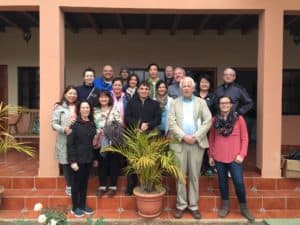
Such a witness is Dr. Rolando Rolandelli and his surgical team from Unidad Hospitalia Móvil de Latino América (UHMLA). Sixteen persons (four surgeons, three anesthesiologists, one assisting physician, three recovery nurses, three operating nurses, one floating nurse, and one translator) came to La Esperanza, HN to provide gastro-intestinal surgeries through the week of March 20 through March 26. They united their good-will with Shoulder to Shoulder and the hospital surgery team and staff. They performed sixty-two procedures (50 surgeries and 12 office procedures). For these sixty-two persons this was not even the most remote possibility, and yet it has happened. Many of these persons literally owe their lives to this incredible undertaking.
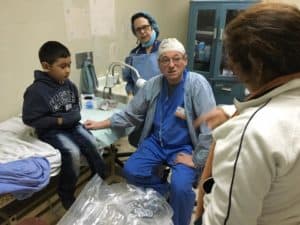
“The only thing necessary for the triumph of evil is that good men (sic) do nothing.”
It is not clear who first said this, but John F. Kennedy often cited it. It is a very interesting quote in its premise. It does not attribute the triumph of evil to a lack of good persons, but rather to the lack of good persons’ actions. Most of us are good, but too few of us actually act. Dr. Rolandelli and his team do not accept the inevitability of inequality. They are unwilling to do nothing. What they did, and what they continue to do, actually changes the world. It is not our goodness that is laudatory; it is the willingness to act. Perhaps someday even the people who live in the Frontera of Intibucá will also not need to accept living in physical discomfort and the threat of death when the resources to treat them are readily available in other parts of the world.
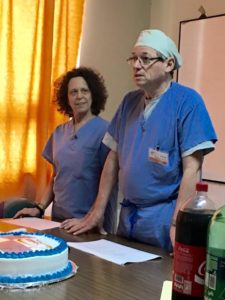
There are at least sixty-two persons who have benefitted because a few good-willed persons did not accept inequality.
To discover more about UHMLA, or to become a good person of action, go to
Facebook: https://www.facebook.com/UHMLA/?fref=ts
Website: http://www.uhmla.com/
photos courtesy of UHMLA via Facebook page
Familiarity Breeds…
Aesop is credited with the first use of the idiom ‘familiarity breeds contempt’ as the moral in the fable The Fox and the Lion. This past week I pondered that adage as each morning I drove out to the small village of Guachipilincito to pick up a few of the Brown / Wingate residents and students and transport them to our clinic and our health center in Concepción. The drive is only about seven kilometers either way, and yet it takes over one-half hour out and in. It is not exactly a road as one normally considers a road. The jagged ledge designed to puncture tires, gaping holes, loose gravel, and boulders to be circled about, demand maintaining the vehicle in first gear and four wheel drive for the entire trip. Beyond that, there is the frustrating, anxiety creating long pauses behind herds of cattle or the inability of two vehicles passing in opposite directions. By the end of the week, I knew that Aesop had got it right: my familiarity of the road only heightened my loathing of the trip.
Brown built the clinic in Guachipilincito and has been coming to the secluded village for years. Wingate School of Pharmacy has partnered with them in more recent years. Though for many of the students and residents, their present brigade is their first experience of the town and its residents, for the leaders and the institutions, Guachipilincito is familiar territory. The townsfolk know them and appreciate their visits. Here, familiarity has not bred contempt, but rather something truly amazing that defies a simple explanation.

Familiarity here seems to have bred a sense of mutual respect and a profound sense of commitment in service. While medical treatment within the local community is the ostensible purpose of the service trip, the team is deeply invested in the wellbeing of the local residents and the larger population. The highly motivated Brown / Wingate team is assessing and treating all the children and adults in the community, offering dental services, feeding children under age 5 years through their nutrition program, and taking a census to discern service needs. Beyond the local community, Brown / Wingate is engaging the wider community. Students, residents, doctors, and other medical professionals are visiting the main clinic and health center in Concepción, working side by side with our Honduran medical staff, professionally sharing and developing more effective, meaningful models of care. At home visits, at the clinic delivering babies, in emergency situations, students and residents see what medical care entails, and Honduran professionals benefit from the knowledge and experience of seasoned and accomplished medical professionals.
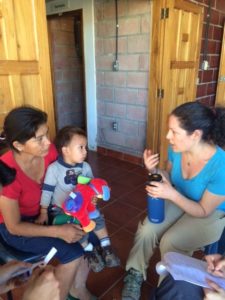
A very special aspect of this brigade has been the presence of child psychiatrist, Dr. Horacio Hojman. Originally from Argentina, Dr. Hojman now practices in Rhode Island and Massachusetts. His treatment of Honduran children and adolescents with psychological challenges was ground breaking, as mental illness is not readily discussed in this area of Honduras. Beyond this, he has been offering professional workshops for medical personnel and teachers such that children will find help and support on a continual basis. We certainly hope that this will be only the first of many visits from Dr. Hojman.

Brown / Wingate has committed to three weeks in February for this brigade. Many participants have already left after the first week, yet much more is still planned for the weeks ahead. Another professional sharing day is scheduled and other meaningful work. What marvelous things they have already accomplished in their ardent commitment to a relationship with a small, isolated community in the backwoods of Honduras. The road to get there is challenging, grueling really, but they have not grown contemptuous from the familiarity of the journey. Instead they have recognized that familiarity, coupled with a committed relationship of service, breeds the dawning of hope.
Article by: Paul Manship and Angela McCaskill Photographs courtesy of Paul Manship and Angela McCaskill


